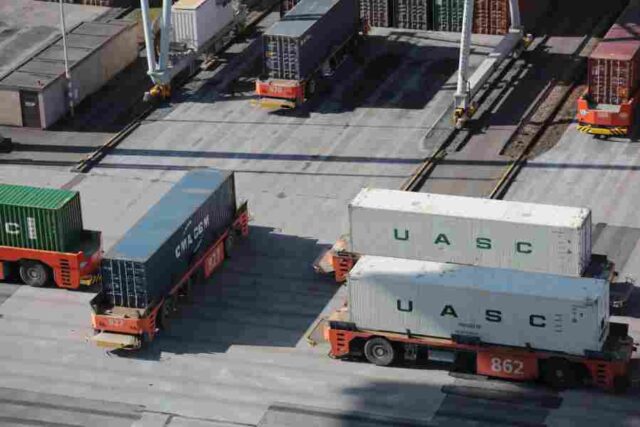Welcome to the exciting world of logistics, where almost nothing happens by chance but by careful planning and execution. This beginner’s guide is designed to provide a comprehensive overview of the logistics sector – an often misunderstood yet vital component of modern society.
Here, we will demystify its key concepts, discuss its integral role in global commerce, explore its various elements, and highlight the skills required to excel in this dynamic field. Whether you are contemplating a career in logistics or merely curious about its inner workings, this guide will enlighten you on the fascinating complexities of this indispensable industry.
Understanding The Concept Of Logistics
Logistics refers to the process of planning, implementing, and controlling the efficient flow and storage of goods, services, and related information from the point of origin to the point of consumption. It serves to meet customer requirements and is a key driver of business success. An effective logistics process ensures that products are delivered on time, in the right quantity, and in perfect condition. It bridges gaps between production and consumption, creating a seamless flow in supply chains.
The scope of logistics is vast, encompassing inventory management, warehousing, transportation, and customer service. It’s a dynamic field that demands problem-solving skills, strategic planning, and a keen eye for detail. For example, a freight broker must anticipate potential delays, reroute shipments, and negotiate favorable rates to keep the supply chain moving. You can click here if you want to do some more research on the field of logistics. Furthermore, logistics professionals must also stay abreast of technological advancements, such as automation and data analytics, to optimize operations continually.
Career Opportunities In Logistics
The logistics sector offers a plethora of career opportunities, ranging from logistics analyst to supply chain manager to transport coordinator. The industry values diverse talent, offering roles that cater to various skills and interests. Logistics professionals often enjoy a dynamic work environment, dealing with different challenges every day. The industry also provides ample opportunities for career advancement, especially for individuals who are inventive, adaptable, and dedicated.
Choosing a career in logistics means joining an industry that is integral to global trade, continually evolving, and offering rewarding career paths. If you enjoy problem-solving, and strategic thinking and thrive in a fast-paced environment, logistics might be the perfect fit for you. The future of logistics is bright, and there’s no better time to embark on this exciting journey.
The Role Of Logistics In Global Commerce
Logistics plays a crucial role in global commerce. It facilitates the smooth flow of goods and services across borders, enabling businesses to reach customers worldwide. Without efficient logistics, the global economy would stall. International logistics involves managing complex factors such as customs regulations, international trade laws, foreign exchange rates, and cultural differences. It’s a delicate balancing act that ensures goods are delivered promptly and efficiently.
The advent of e-commerce has further elevated the role of logistics. Online retailers rely heavily on logistics to fulfill customer orders swiftly and accurately. The future of global commerce hinges on innovative logistics solutions that can keep pace with evolving consumer demands. With the rise of same-day delivery and increased customer expectations, logistics providers must be adaptable and resilient to succeed.
Elements Of Logistics
Logistics comprises several elements, each playing a significant role in ensuring goods and services reach their intended destination. These elements include transportation, warehousing, inventory management, and order fulfillment. Transportation involves moving goods from one place to another using various modes such as air, sea, rail, or road. Warehousing is about storing goods safely until they’re needed for distribution. Inventory management ensures there’s an optimal level of stock to meet customer demand without tying up too much capital.
Order fulfillment focuses on processing customer orders quickly and accurately. Each element is interlinked, forming a cohesive system that drives business efficiency. For instance, a warehouse must be located strategically to facilitate quick and cost-effective transportation. Inventory levels must be managed carefully to avoid stockouts or surplus stock, both of which can lead to financial losses.
Skills Required In The Logistics Industry
The logistics industry demands a diverse range of skills. Strategic thinking and problem-solving abilities are vital, as logistics professionals often need to devise efficient routes and manage unforeseen challenges. Communication and negotiation skills are equally important, especially when dealing with suppliers, customers, or regulatory bodies. Understanding complex logistic software and being able to interpret and analyze data is also crucial in this tech-driven industry.
Logistics also requires individuals who can thrive under pressure. With tight deadlines and high customer expectations, the ability to remain calm and focused is a prized quality in this fast-paced field. Flexibility, adaptability, and a continuous improvement mindset are also highly valued in the logistics world.
Also, logistics professionals must have a customer-centric approach. In this industry, meeting customer demands and expectations is paramount to success. This means understanding the needs of customers and providing solutions that meet their requirements while keeping costs in check.
The Impact Of Technology On Logistics
Technology has transformed logistics, introducing automation, real-time tracking, and predictive analytics. These advancements have increased efficiency, reduced errors, and enhanced customer service. For instance, automation in warehousing has streamlined inventory management, while GPS technology has revolutionized route planning. Predictive analytics enables proactive decision-making, helping businesses anticipate demand and adjust their strategies accordingly.
Technology’s impact on logistics is ongoing, with new advancements continually redefining the industry. From drones to self-driving vehicles to blockchain, the future of logistics lies in harnessing these technological breakthroughs. As such, the logistics industry will continue to attract individuals with a keen interest in technology and its potential to drive business success.
In the dynamic and intricate world of logistics, the importance of careful planning, efficient execution, and constant evolution can’t be overstated. A career in this sector presents not only numerous opportunities but also the chance to be a critical player in the global economy. With the rise of technology and its transformative potential, logistics offers a vibrant and challenging environment for professionals to thrive.
As you embark on this journey, remember that the diverse skill set, strategic perspective, and relentless focus on improvement will be your compass, guiding you through the exciting complexities of the logistics landscape. Whether you’re a seasoned professional or a beginner stepping into this realm, logistics promises a future of continual learning and growth.














